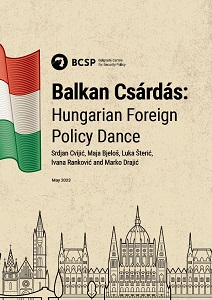Balkan Csárdás: Hungarian Foreign Policy Dance
Balkan Csárdás: Hungarian Foreign Policy Dance
Author(s): Srđan Cvijić, Maja Bjeloš, Luka Šterić, Ivana Ranković, Marko Drajić
Subject(s): Politics / Political Sciences, Politics, International relations/trade, Geopolitics
Published by: BCBP Beogradski centar za bezbednosnu politiku
Keywords: Hungary; Hungarian Foreign Policy; Western Balkans; international relations; regional relations
Summary/Abstract: As part of the overall focus on the democratic backsliding in Hungary since Viktor Orbán’s Fidesz reassumed power in 2010, numerous international observers have expressed concern regarding increasing Hungarian influence in the Western Balkans.1 Specifically, many fear that through intensified meddling in Western Balkan affairs, Orbán’s Hungary would spread its illiberal influence throughout the region and subsequently undermine broader EU policy. In 2019, the process leading to the appointment of Olivér Várhelyi (a Hungarian diplomat close to Orbán) to the position of the European Commissioner for Neighbourhood and Enlargement garnered a salvo of criticism.2 While this incident briefly attracted the European media floodlights to the topic, the issue of Hungarian influence in the region of the Western Balkans quickly faded into a relative obscurity. Apart from few exceptions and a handful of journalistic accounts (which will be quoted extensively throughout the study), there are little to no attempts to analyse and explain Hungarian foreign and trade policy in the Western Balkans. This paper is one of few all-encompassing efforts to explain Hungarian policy and involvement in the Western Balkans, and it attempts to do so by asking the following questions: What interests and strategic considerations drive Hungarian foreign and trade policy in the region? What are Hungarian foreign policy priorities and what instruments does Hungarian foreign policy have at its disposal in the region? Is Orbán’s Western Balkan policy marked by a total discontinuity with regards to previous Hungarian foreign policy towards the region? Who formulates foreign policy priorities in Hungary and what is the interplay between formal and informal actors? What economic interests shape Hungarian foreign policy in the region? What is the role of ideology in Hungarian foreign policy in the Western Balkans? How much has Hungarian foreign policy in the region changed as a result of war in Ukraine? To answer these questions, this paper is divided into four main sections. The first focuses on Hungary’s foreign policy strategy in the region. The second, as a special case study, investigates the effects of Orbán’s minority politics in Serbia’s Autonomous Province of Vojvodina (Vajdaság in Hungarian). The third, researching Hungarian media empire in the region, and finally the fourth focusing on the economic drivers of Hungary’s approach in the region.
Series: Beogradski Centar za Bezbednosnu Politiku - Analysis
- Page Count: 56
- Publication Year: 2023
- Language: English
- Content File-PDF

